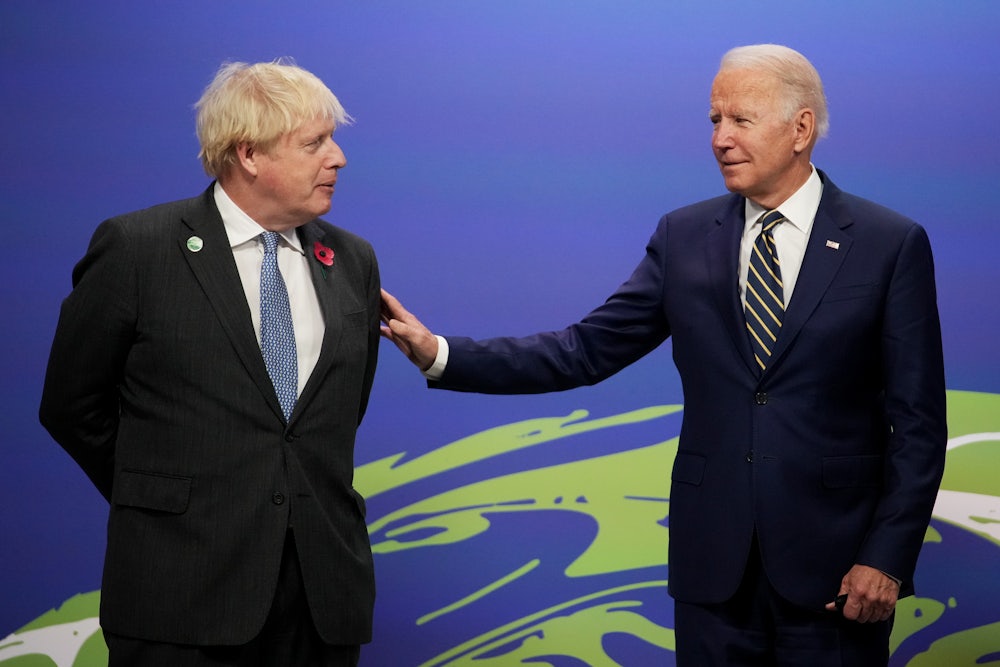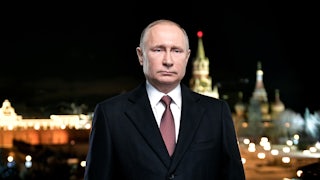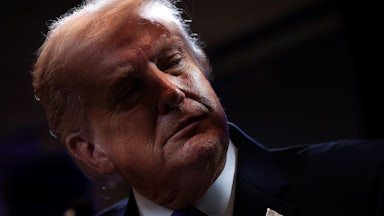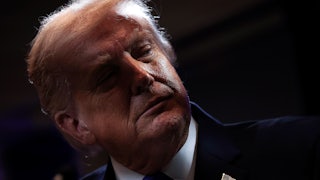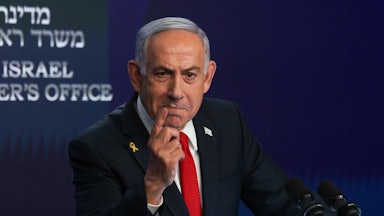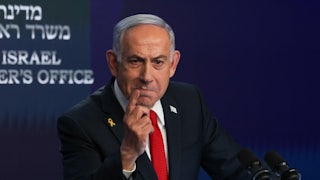The little things stood out during Joe Biden’s sober nine-minute Tuesday afternoon speech addressing the most serious superpower crisis of this century.
The president, once again demonstrating U.S. intelligence capabilities, stressed that Russian President Vladimir Putin had been moving blood and medical supplies to the Ukrainian border. As Biden put it—in words that any armchair general at home could understand—“You don’t need blood unless you plan on starting a war.”
Biden sidestepped the semantic trap of “when is an invasion an invasion?” that so aroused the talking heads on cable TV during the hour-long delay before the president spoke. Biden accurately dubbed Putin’s movement of Russian tanks into the breakaway regions of eastern Ukraine as “the beginning of an invasion.” That formulation allows Biden the flexibility to up the ante if—or probably when—Putin takes the next overt steps toward open warfare.
Maybe the most important part of Biden’s speech was a few lines that might sound like foreign policy boilerplate. “The United States and our allies and partners are working in unison,” the president stressed, adding that this is something that Putin “hadn’t been counting on.” Instead of a squabbling and feckless NATO and European Union, Biden stressed, “we are united in our support of Ukraine. We are united in our opposition to Russian aggression.”
In containing this Putin-created crisis, everything depends on maintaining that unity for months and years to come, if necessary. At the center of the struggle for Ukraine’s future and independence are the two major factors that shape any confrontation with Russia: nuclear weapons and energy.
It remains a major miracle that no nuclear weapons have been used in warfare since the United States dropped an atomic bomb on Nagasaki in August 1945. Over the last three-quarters of a century, the nuclear powers have held the line during the proxy battles of the Cold War, the frightening Cuban missile crisis, the tinderbox confrontations between India and Pakistan, as well as the dangerously erratic rule of Kim Jong Un in North Korea.
Russia’s nuclear arsenal means that in any military confrontation with Moscow, Ukraine will, alas, be on its own. No rational national security expert wants to send American troops to Kyiv in defense of a nation with which we have no formal military alliance. It is a sad but unavoidable reality that Putin is trying to exploit.
That is why Western unity around strong, punishing sanctions against Russia is so important: They are the only major weapon that we can deploy. And the biggest threat to effective sanctions is the desperate European demand for energy.
Yes, it is a welcome development that Germany under Olaf Scholz, its new center-left chancellor, has halted the approval process for the Nord Stream 2 pipeline that runs under the Baltic Sea from Russia. But the danger is that this bureaucratic move—which will prevent the use of an already built natural gas pipeline—could be rescinded at any point. For Putin to suffer, he would have to know that the pipeline would never operate as long as Russian troops occupied even an inch more of Ukrainian territory (they have been in Crimea since 2014).
Just last week, Italian Prime Minister Mario Draghi said that anti-Russian sanctions “must be as narrow as possible, without including energy.” That no-energy-please sentiment was undoubtedly influenced by Italy’s dependence on Russia for more than 40 percent of its natural gas.
The unavoidable problem in free societies is that sanctions cut both ways and often come with a political cost. Biden himself acknowledged this Tuesday: “Defending freedom will have costs for us as well—and here at home. We need to be honest about that.” With the Democrats panicked that inflation will be a devastating political issue in the midterm elections, Biden announced a vague plan to “blunt gas prices … to limit the pain the American people are feeling at the gas pump.”
Since the early days of the Cold War, American voters have approved without much thought virtually every pricey weapon system that the Pentagon has wanted in the name of U.S. military superiority. But when it comes to price increases from economic sanctions or boycotts to try to avert war, the general response of American consumers has long been, “Why me?”
Compounding the potential political problems for Biden was the immediate reaction to the Ukrainian crisis from Putin’s leading American fanboy. In a Tuesday radio interview, Donald Trump gushed that Russia’s move into eastern Ukraine was “genius” and praised Putin as “savvy.” But it is not just Trump. Former Secretary of State Mike Pompeo, with ill-concealed political ambitions, has also been pumping for Putin, saying recently, “I have enormous respect for him—I’ve been criticized for saying that.”
All of this helps explain why Putin probably will believe—to the bitter end—that Americans and Europeans will eventually lighten economic sanctions to avoid voter rebellions. That risk is much greater in Europe, given the heavy dependence on Russian natural gas. A bitterly cold winter of 2022–23 could put a chill on the West’s commitment to freedom for the Ukrainians.
Of course, all the moves on the geopolitical chess board would be different if Ukraine had oil, as Kuwait did when Saddam Hussein invaded in 1990. Shortly after Iraqi troops occupied the country, Margaret Thatcher told George H.W. Bush, “Remember, George, this is no time to go wobbly.”
In his rich fantasy life, beleaguered British Prime Minster Boris Johnson sees himself as the twenty-first-century heir to Winston Churchill. But in truth, the ever-wobbly Johnson has the inner resolve of a bowl of Jell-O. Earlier this month, Johnson’s government tabled a strong set of sanctions as Parliament was heading into recess. Now, in the wake of Putin’s military movements in eastern Ukraine, Johnson boldly sanctioned three (count them) Russian oligarchs. It was a “round up the usual suspects” moment in London, since the three Russian billionaires had long been under American sanctions.
In truth, no country has more power to shape Russian behavior than Great Britain, since it has got Putin’s cronies where they live—or more precisely, where they want to live. Neighborhoods of London like Belgravia are so popular with Russian billionaires that they are known as “Londongrad.” Part of the long-term prosperity of London is directly linked to the eagerness with which establishment bankers display an exceedingly tolerant attitude toward the origins of Russian money. And Guardian columnist Marina Hyde described Putin as “the only megarich Russian who doesn’t get their cosmetic surgery done in London.”
A severe clampdown on Russian visits to London might have almost as much power as strong economic sanctions. Because with Putin at the head of a government of crony capitalism, the only way to shape his behavior is to crack down on his cronies.
Biden has done everything in his power to rally the West and forge unity with NATO and the EU. But in the anxious days and months ahead, the true test is whether sanctions alone can thwart a megalomaniac determined to reassemble the Soviet Union through brute force.
